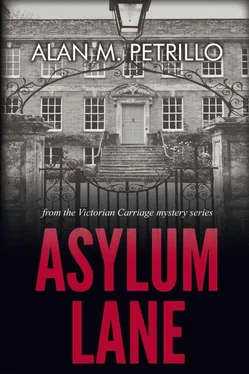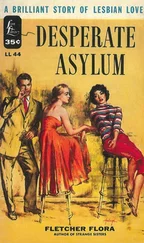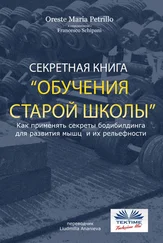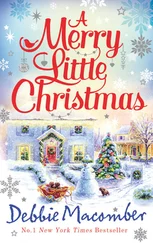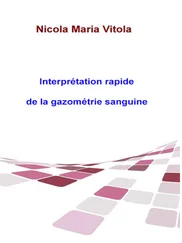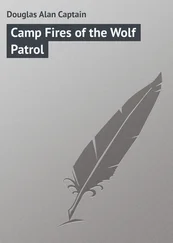The man standing in the doorway was the direct opposite of Goodwin. Where Goodwin was short, fat and bald, the other man was tall, slender and sported a full mane of silver hair.
“You heard the conversation?” Goodwin asked.
“I did. You must realize that the good vicar could in no way have accumulated that amount of money unless it was through nefarious means.” When the man spoke, his voice sounded as smooth as a lake’s surface after a rain.
“What of the possibility that the vicar had money from his family?” Even Goodwin himself didn’t believe that could be the case, yet he broached the possibility nonetheless. He had been taught always to be thorough.
“Why would a man who had money from his family not immediately find a secure investment in which to hold that money?”
The silver-haired man paused momentarily, but appeared satisfied when Goodwin did not respond.
“Perhaps if it was recently-acquired money, then we may be involved with a much different situation. But such information is easily ferreted out, as you are well aware.”
Goodwin lowered his gaze and nodded. He was a master at prying the true story from behind a wall of fabrication.
“I shall have the answer to that riddle right quick enough,” he said. “A day or two is all I shall need.”
“And if the situation is as we expect, that the vicar has somehow had five thousand pounds bestowed on him by an unknown benefactor?”
“Then we shall put the funds to good use. The Clifton property that we own is certainly one we could sell to the good vicar, at a nice profit, of course.”
“Damn the nice profit,” the slender man spat out. “We shall inflate the value a thousand percent. Perhaps more. There’s no sense letting a sheep like the vicar walk by without helping ourselves to its fleece.”
Goodwin smiled broadly, gripping the pipe stem tightly between his front teeth. “You always had a way with words, father. You actually should think of taking to the pulpit yourself, with that silver tongue.”
The older man grinned and shook his head. “I’m quite content playing the game, son. Quite content, indeed.”
* * *
Round Freddy knew he was a worrier. The way he saw it, the reason for his worrying was unimportant. His disposition led him to believe that by worrying about something — anything — he could catalyze his reasoning powers into action and apply them to the case he was investigating. As the ranking detective sergeant in the York Police, he had the choice of cases, and often chose those that were either unusual or especially difficult.
He looked at the case materials laid out on his desk and shook his head. A sewing bobbin, three matches, a half-sheet of paper that had been wadded into a ball so many times that the pencil writing on it was illegible, a woman’s handkerchief with a “J” monogrammed in one corner, a torn handbill promoting a Temperance Society meeting, and a copper penny. Not a terribly remarkable accumulation of goods, he thought, except for the fact that the effects had been removed from the dead body of a man, dressed as a woman.
How the disguised man had come to be dead was the puzzling part of the case. The body bore no visible wounds or unusual marks, nor were there any signs of a struggle.
The deceased’s mode of dress certainly cast the tenor of the case into the unusual category, Round Freddy thought. But the lack of an obvious cause of death also made him wonder whether he should take the case on or not. His desk already overflowed with work. The First Presbyterian Church on Conley Street had been broken into and ransacked two weeks previously, two elderly women had been bilked out of their life savings by a smooth-talking Frenchman, the wealthy owner of the Cocoa Works had not been seen for months and his wife was attempting to collect on an insurance policy, and the weekly payroll had been stolen at gunpoint from the York Flour Mills by two hooded men. Added to that was this latest case, the abduction of Miss Waddington from Bootham Park. Who in the world, he mused, would want to steal someone from an insane asylum?
Round Freddy held the handkerchief up to the light and scrutinized the monogram. Fine workmanship, he thought. Surely the man must have had money to purchase fine linens.
A loud rap on the doorframe broke his train of thought. It was Andrews, the young constable with big eyes and few questions.
“Beggin’ your pardon, detective sergeant, but I have the report on the items taken from the First Presbyterian Church.” Andrews shifted uneasily in the doorway. “You said you wanted it straight away.”
Round Freddy extended his hand and took the offered pages.
“Anything interesting on the list?”
“Sir?”
“Are there any items on the list that jump out at you, constable? Anything that is out of the ordinary?”
Andrews furrowed his brow and put his forefinger to his lips as if he were retaining a secret. “Now that you ask, sergeant, there was something on the list that caught me eye.”
“And what would that be?”
“The reverend’s double barrel pheasant gun.”
“Just so,” Round Freddy replied. “What would a pheasant gun be doing in a house of worship?” He cleared his throat and dropped the handkerchief to the desk. “Perhaps we should ask.”
•••••
Elias Lund peered over his shoulder at the crowded pavement on Blake Street, then ducked unnoticed through the door of the Hound and Hen Public House, bumping the hip of a overweight tramp who smelled of stale ale and dead fish. The tramp gave Lund a beery smile and pushed through the doorway in the opposite direction, leaving a trail of odor and dirt behind him.
Lund stepped to the bar, brushing his sleeve vigorously as he surveyed the room, then wedged himself between a wooden post and an inebriated old man. He looked around the barroom again, but could see nothing of the man he was to meet because of the crowd, most of whom appeared to be either smelly or unwashed or both, he thought. As Lund turned back to the bar, the publican appeared and cocked his head to one side, his eyebrows raised in expectation.
“A Thatcher’s, and mind you fill it to the brim.”
The publican had already turned away, but quickly spun back, and leaning over the wide wooden bar, moved his face to within inches of Lund’s.
“If ye think ye’ll be cheated here, little man, ye can always get drink at the Queen’s ‘ead down the road.”
Lund pulled back and fluttered his hand in the air. “Your Thatcher’s will be fine.”
The publican grunted and turned to the tap, drawing a frothy dark liquid into a chipped pint mug. He slid the mug along the bar, and it stopped directly in front of Lund.
As Lund reached to grasp the handle, a hand shot past his and snatched the pint from the bar, spilling the top inch over Lund’s coat sleeve.
“What do you think you’re doing?” Lund’s voice rose as he spun to face the man who had snatched his drink. “Oh, it’s you. Where have you been?”
“It’s not for you to question me, Mr. Lund.”
Lund bristled, but made no reply.
“Ah, nothing to say. Please remember it was you who sent word to meet here.”
“I’ve not forgotten, but you need not be so rude as to take what does not belong to you.”
The man regarded Lund for a moment, then threw back his head and gave a deep, cackling laugh. “You would have stood me to a pint in any event, Lund. I simply took the first one available.”
Lund’s ears reddened and a quick reply formed on his lips, but he choked it back, taking a deep breath.
“I’ll thank you to pay close attention to what I have to say,” he murmured, “as I shall only do so one time. I don’t fancy repeating these instructions in such a place where it can be overheard by anyone.”
Читать дальше
